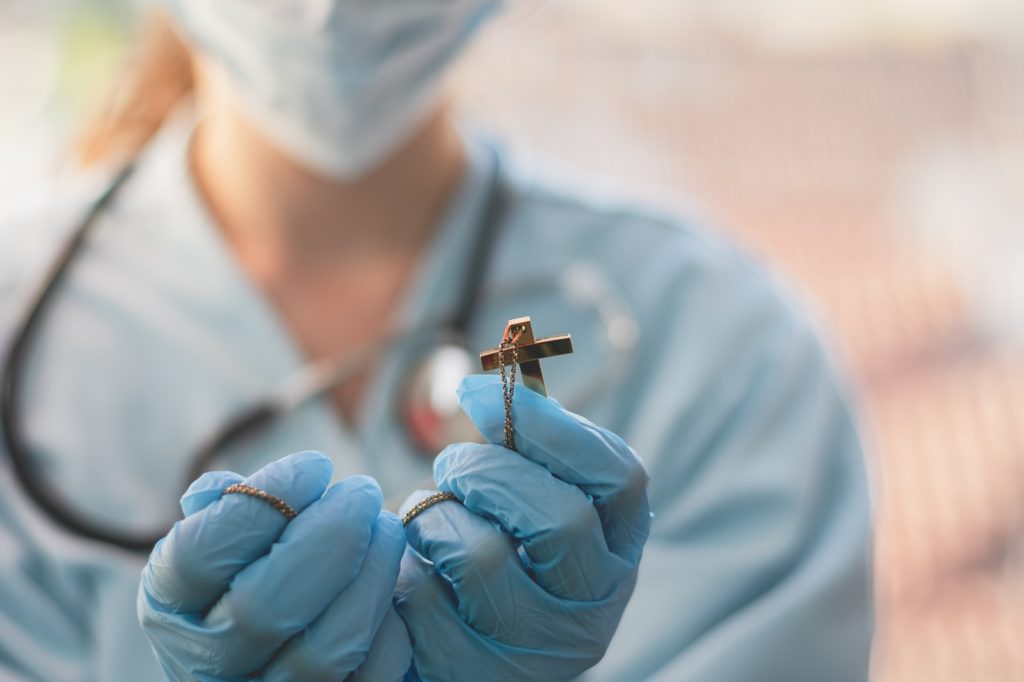Strongly held opinions about vaccines and vaccination are the subject of explosive debates in America. We expect these debates to become more intense as COVID-19 vaccines are approved and distributed.
Unless we consider the moral shape of the challenges confronting us as a society, we will be overwhelmed by the loud, often extreme voices that reduce complex decisions about vaccinations to rival narratives that pit individual sovereignty against state authority. We write as three Christian ethicists, who believe the moral tradition we speak from not only can inform how Christians should think about their responsibility to be vaccinated against COVID-19, but can also illuminate public debate, helping it become more productive. We hope to present a perspective that cuts against all-or-nothing analyses. In the end, we believe the goods associated with vaccination outweigh the risks or goods born of refusing vaccination.
In the end, we believe the goods associated with vaccination outweigh the risks or goods born of refusing vaccination.
The ethical questions raised by COVID-19 vaccines center around three primary considerations: safety and efficacy, complicity with evil, and compliance with authority. We will deal with each in turn.
Start your day with Public Discourse
Sign up and get our daily essays sent straight to your inbox.Safety and Efficacy
Because of the rapid pace of development under Operation Warp Speed, it seems natural to worry that COVID-19 vaccines may not be as safe and effective as they would have been if they were developed more slowly. Although it is true that the vaccines have been developed quickly, the same scientific process has been followed. In fact, because the stakes are so high, the scrutiny and oversight have never been more intense. Dan Barouch, a vaccine researcher at Harvard, maintains, “Never before have there been vaccine trials that have been followed so closely from inception to onset to conduct.”
Second, the ways the process has been accelerated have not compromised safety. Protocols followed by the FDA are rigorous and include months of safety surveillance. Most side effects of vaccines show up within six weeks, so there has been plenty of margin to monitor for adverse events. The unpleasant side effects—such as headaches, fatigue, and pain at the injection site—are real. We should all be fully informed about them. Still, they have affected relatively few patients, and they are manageable.
Although it is true that the vaccines have been developed quickly, the same scientific process has been followed. In fact, because the stakes are so high, the scrutiny and oversight have never been more intense.
Third, the COVID-19 vaccine trials are unusually large, which means that they offer a great deal of evidence of safety and effectiveness. A normal Phase 3 vaccine trial might involve 3,000 to 6,000 volunteers and run for a number of years. But the Pfizer trials enlisted 44,000 participants, and the Moderna trials had 30,000 participants. The extraordinary scale of the trials has increased the probability that adverse effects will show up if they are likely.
Another frequent concern is that mRNA vaccines are relatively new. Although this is true, mRNA vaccines have been studied for several decades. Actually, the design of mRNA vaccines is fairly simple. According to the CDC,
To trigger an immune response, many vaccines put a weakened or inactivated germ into our bodies. Not mRNA vaccines. Instead, they teach our cells how to make a protein—or even just a piece of a protein—that triggers an immune response inside our bodies. That immune response, which produces antibodies, is what protects us from getting infected if the real virus enters our bodies.
There are still questions about an mRNA vaccine. The vaccines have more side effects than a regular flu shot, but they are not long-lasting or severe. For most people, they are relatively mild. About 5 percent of the people who got the Pfizer vaccine and 10 percent of those who received the Moderna vaccine had flu-like symptoms for a day or two. It is possible that the vaccine may not work for everyone. Still, even if it does not protect you from infection, experts believe that it should reduce the severity of the disease.
Although there will always be risks associated with vaccines—old ones or new ones—the level of risk is very small, especially given the risk of contracting the virus. There are many drugs on the market that pose greater risks than any vaccine, including common drugs like acetaminophen. In spite of the risks, we continue to take these drugs when they are medically indicated.
We think there are good reasons to trust the NIH’s, CDC’s, and FDA’s processes in developing safe and effective COVID-19 vaccines. As Dr. Anthony Fauci has said,
People need to understand that the speed of [vaccine development] is a reflection of the extraordinarily exquisite—breathtaking in some respects—advances in science which are allowing us to do things in weeks to months that formerly took years without compromising safety and without compromising scientific integrity.
Given the U.S. government’s checkered history, we understand why some, especially in the African American and Latino communities, will not trust the system to protect them. We must, therefore, continue to demand the highest levels of transparency about side effects and efficacy of the COVID-19 vaccines, as we should with all new vaccines and medical treatments.
Complicity
Another common concern raised about vaccines is whether their development or confirmatory testing from fetal stem cell tissue derived from decades-ago abortions makes one complicit in an evil act.
Public Discourse has published a number of essays (here, here, here, here, and here) arguing that an individual is not formally cooperating with a moral evil when using a vaccine developed thanks to an abortion. Joe Carter also has a helpful explainer articulating why vaccines using immortalized fetal cell tissue are not ethically disqualified from use.
No abortions occurred in the development of the COVID-19 vaccines. Nor is it certain the original abortions from which the cell lines were initially established were performed for the sake of research or developing vaccines. The cell lines involved in developing and confirming the viability of COVID-19 vaccines were used as a result of previous abortions. They were not the cause of any new abortion.
The moral equation to consider includes the issues of (1) procurement; (2) cooperation; (3) appropriation. It seems the case that vaccine development will occur with some degree of illicit procurement looming in the background, as the sheer fact of abortion is a blemish on any and all factors. Yet individuals who use the vaccine are not guilty of cooperating with or perpetuating intrinsic evil. Finally, a prior or antecedent intrinsically unjust act could be appropriated for proportionately beneficial ends. We should concede the ethical validity of vaccine use, while not ignoring the problematic origins of its development.
Compliance
A different ethical question relates to whether an individual must comply with a government, employer, or civil society mandate to be vaccinated.
First, we should acknowledge up front that we doubt the government will impose mandates on civilians. We could be wrong about this, and if they do occur, we will have to confront those challenges as they arise. We think it more possible that employers or businesses require their employees or customers to provide evidence of vaccination to return to work or patronize their businesses. Considering the role of the market in guiding consumer choices, we believe that customers have tremendous ability to register their protest or compliance with the expectations of private businesses. Given the constitutional freedoms private businesses enjoy, they will each have to determine—to their own success or detriment—what type of compliance policies to require of their employees or customers.
From a moral point of view, it is important that individual conscience not be violated. Individuals may have personal reasons for temporary or indefinite refusal. Perhaps a person might wish to see better long-term evidence, for example, or might delay vaccination so that more vulnerable members of the population may receive it first. That latter example, under conditions of strained supply, represents a real act of charity. If mandates are widely issued, legal cases in defense of conscience rights will almost certainly find their way through the courts.
Christian Discipleship and the COVID-19 Vaccine
According to the New Testament, faith and obedience to Jesus Christ in discipleship involves dying to self, taking up his cross. The apostle Paul goes so far as to describe it as no longer the person who lives but Christ that lives within them (Gal. 2:20). Disciples love God and love their neighbor, as God commands. Loving another person can involve many things, but it at least involves seeking their good, a good that includes their health and vitality.
If by the minimal burden of wearing a mask, we can potentially protect others from grave illness, then it seems we have a moral obligation to wear a mask. The same can be said for COVID-19 vaccinations.
It is not possible to properly love a person and to act unnecessarily to jeopardize their health. By this, we mean displaying wanton disregard for the health of others. If by the minimal burden of wearing a mask, we can potentially protect others from grave illness, then it seems we have a moral obligation to wear a mask. The same can be said for COVID-19 vaccinations. If by being vaccinated we can protect others from illness, then we have a corresponding obligation, given our Lord’s command to love neighbors, to be vaccinated. Vaccinations not only protect me, but also protect other vulnerable members of society. At the same time, we acknowledge that the call to love one’s neighbor does not justify—carte blanche—all action taken to lessen transmission or the forfeiture of one’s own conscience.
A disciple may be vaccinated out of love for God and neighbor, but perhaps also because it is wise. Christians are not rash or foolish about their lives. They are instead sober-minded and ready, on the basis of evidence furnished by reality itself, to form judgments on particular courses of action. It seems wise to be vaccinated, because doing so may protect one’s own life and the lives of others.
Being vaccinated likewise demonstrates that we care about the common good. We wish for all to enjoy a whole, joyful life for as long as the Lord provides. Disciples of Jesus do not wish for anyone to be cut off from the fruits and joys of human community and fellowship, but for all to give and receive in grace and hope. Vaccinations assist us in joining together to share in the goods we have in common.
At the same time, we also acknowledge the sincerity of those whose consciences disagree in good faith. Perhaps there are parents who, once a child vaccine is developed and approved, are sincerely fearful that the rushed nature of the vaccine’s development has long-term unknown costs. Despite our own convictions about the rigorous protocols to ensure safety and efficacy, we believe that Christian liberty requires that each person be free to choose whether or not to receive these new vaccines.
Vaccination is a salutary act born of Christian love for neighbor and community, not a test of faithfulness.
Still, blanket appeals to Christian liberty are not sufficient. They require evidentiary substance. The libertarian-minded citizen who reflexively rejects any claim of authority has not adequately met the necessary threshold to refuse vaccination. Those appealing to Christian liberty or conscience have the burden of demonstrating what goods are procured, secured, or respected that surpass the goods associated with vaccination. We are not saying such arguments are impossible to make or possibly worthy to act upon. However, we do believe the goods associated with vaccination outweigh the risks or goods born of refusing vaccination.
Because we believe that concerns about vaccination do not rise to the threshold necessary to justify forgoing it, we believe that it is strongly morally advisable to get vaccinated. However, even if this rises to the level of a moral “ought,” that does not mean we think churches should discipline their members if they refuse to get vaccinated. Nor does it mean that an individual who forgoes the vaccine is necessarily sinning. Vaccination is a salutary act born of Christian love for neighbor and community, not a test of faithfulness.
Christians, pastors, and local churches should approach this conversation with forbearing love. We should refuse the temptation to harshly or condescendingly judge those with whom we have disagreements.














